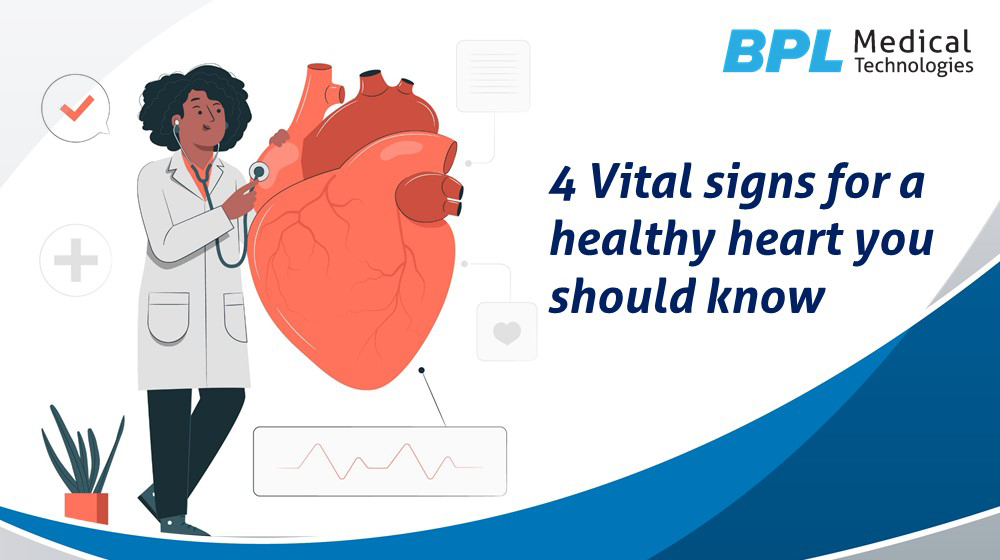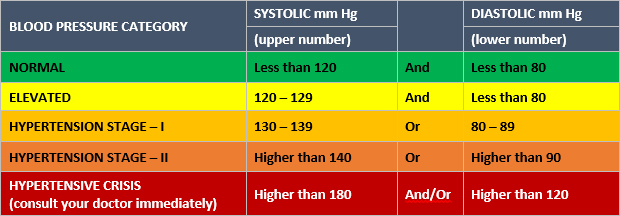
Can you confidently say that your heart is healthy? While maintaining a balanced diet and exercise routine surely helps, it’s equally important to be sure how your heart responds to it. Read on to know the five indicators for a healthy heart.
1. BLOOD PRESSURE
Blood pressure indicates how hard your heart works (at rest as well as during a physical activity) and the condition of your blood vessels. As the name indicates, blood pressure is the force exerted on your arteries when your heart contracts (systolic blood pressure) and relaxes (diastolic blood pressure). While some situations cause our blood pressure to rise, people having a persistently raised pressure on their blood vessels over a significant period of time are said to have high blood pressure or hypertension.
What is ideal vs high blood pressure range?

Refer to the below table to understand the difference between normal and high blood pressure range.
Source: American Heart Association
Note: The values in the above table are for information purpose only, kindly consult with a medical professional.
While having an ideal blood pressure is a good goal for most people, factors like your age, sex, family health history or any other underlying health conditions will determine the ideal blood pressure range to aim for. Discussing the same with a doctor is the best way to determine the ideal BP range for you.
What is the impact of high blood pressure on heart health?
Inflexible, thin arteries cause the blood pressure to rise. High blood pressure damages blood vessels, encouraging buildup of a fatty plague. If left untreated, this may increase the chances of heart attack. Hypertension can also cause the heart’s pumping chamber to enlarge, resulting in heart failure. In addition, a blocked blood vessel in the brain, that occurs majorly due to high blood pressure, may lead to stroke. [Source - Havard Health]
What helps?
Since heart attack and stroke don’t have any visible symptoms or signs, it’s best to maintain heart health with a well-balanced diet, exercise routine and a periodic blood pressure monitoring – which can be done in a doctor’s clinic, a hospital setting or at home.
BPL range of home BP monitors are fully digital and automatic devices that provides clinically accurate blood pressure readings every time. With BPL home BP monitors, you can -
- Measure and monitor the blood pressure at home comfortably.
- Detect irregular heartbeats by getting alerts from the device.
- Record, store and share your BP readings periodically with your doctor to analyse the blood pressure trends.
- Validate if the lifestyle changes (such as diet, medication and exercise) are effective.
In case if you have a persistently raised blood pressure or hypertension, we encourage you to keep a reliable home BP monitor handy and do regular checks safely at the comfort of your home, so that you are steered clear of any cardiac problems in future. You can very easily buy your very own BPL home BP Monitor from Amazon or Flipkart.
2. LDL Cholesterol
Cholesterol is a fat-like, waxy substance that is produced by the body and found in animal-based food items. It moves throughout the body by lipoproteins found in the blood. Low-density lipoprotein (LDL) cholesterol is one of the types, often known as the “bad cholesterol”
Why LDL is bad for heart health?
According to Havard Health, LDL cholesterol is responsible for narrowing the arteries. They build up on the artery walls and cause blockages, leading to a health condition called atherosclerosis. Blood tests or lipid profile are most common ways that indicate the cholesterol levels in the bloodstream. These tests should be carried out only when advised/recommended by a healthcare provider.
Ideal vs high LDL cholesterol level
Normal levels of LDL vary depending on factors such as age, sex and other health condition. Discussing the values from your blood test report with your healthcare provider will give you clarity about your overall heart health and help you find different ways to improve your LDL levels.
What helps?
Depending on your LDL levels from the test, your healthcare provider may advise you to minimize food containing fats linked to LDL cholesterol. These might include reducing intake of saturated fats and trans fats. Saturated fats are food items generally in solid-state in room temperatures, which are commonly sourced from animal-based food products like meat, cheese, butter, etc. Trans fats are found in fried foods & fast foods. Your doctor may also advise you to include certain physical activities to bring the levels in control.
3. Triglyceride
Triglycerides are the most common form of fat found in the bloodstream. Our body produces energy from the food we eat. Excess amount of calories, alcohol and/or sugar that the body can’t use is usually stored in the fat cells of our body in the form of triglycerides.
Ideal v/s high triglyceride level
Just like LDL cholesterol, high triglyceride levels may contribute to thickening and/or hardening of the arteries, thereby linking it with stroke or heart attack. High levels may also signal other conditions, including any issues with your metabolism or weight.

Source: Mayo Clinic
Note: The values in the above table are for information purpose only, kindly consult with a medical professional first.
What helps?
According to Mayo Clinic, making lifestyle changes such as to quit smoking, eating better and getting more exercise will address your high triglycerides level and improve your heart health. If you are overweight, losing some extra weight may lower triglycerides. We advise you to consult with a medical professional before beginning with a new dietary or exercise regimen.
Developing lifestyle changes and maintaining your weight might become challenging, so having your personal weighing scale would make it better. You can always step on the BPL personal weighing scale - BPL PWS-01 and keep your weight in check, so that you stay on the right path and reach your fitness goals. High-precision sensors ensure the maximum accuracy after each measurement. Now available on Amazon and Flipkart.
4. BLOOD SUGAR
Sugar is naturally found in food items that contain carbohydrates, such as vegetables, fruits and grains. The body digests these food items slowly and uses the sugar in them as a steady source of energy. However, problems surface when a person consumes food that contains added sugar, generally found in manufactured food items.
Why high sugar is bad for heart health?
According to Havard Health, excess sugar in blood makes platelets stickier, which may form blood clots and in turn significantly increase the risk of a heart attack or stroke. High blood sugar also damages blood vessels and promotes LDL to form thick artery layers. High blood sugar is generally linked to diabetes, which not only affects the heart but other parts of the body as well.
What helps?
Depending on your blood sugar levels, your doctor may recommend a combination of certain medications and dietary changes such as avoiding sugary beverages and foods, etc. As a practice, try reading the amount of sugar mentioned in food labels before purchasing any item from the market, as it helps you to understand the quantity of sugar present in them.
Disclaimer: The information included at this site is for educational purposes only and is not intended to be a substitute for medical treatment by a healthcare professional. Because of unique individual needs, the reader should consult their physician to determine the appropriateness of the information for the reader’s situation.



Comments
Thanks for making quality and affordable medical devices in India. www.respbuy.com
By RespBuy
Thanks for making quality and affordable medical devices in India. respbuy.com
By RespBuy
Thanks for making quality and affordable medical devices in India. respbuy.com
By RespBuy
Informative content..!
By lifeblyss
I recently read a great article about vital signs and the role of patient monitoring systems. It was very informative and well researched. It had lots of useful information about the importance of keeping a close eye on vital signs in order to ensure proper patient care. The article also discussed the various types of patient monitoring systems available and how they can help healthcare providers. I highly recommend it to anyone looking for up-to-date information in this field.
By sagar